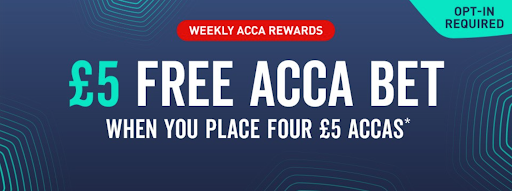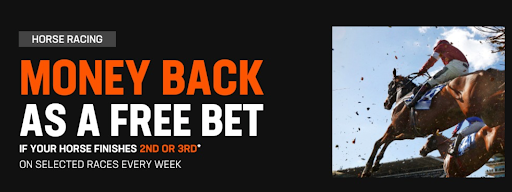What Is A Qualifying Bet? A Beginner’s Guide
In simple terms, a qualifying bet is the initial bet you place with a bookmaker when taking part in an offer, which allows you to access a free bet or another reward.
Qualifying bets are one of the first and most important concepts you’ll encounter when you first learn about Matched Betting, and it’s important to have a good understanding of how they work.
So we’ve put together a comprehensive guide to take you through every type of qualifying bet, to make sure you’re never at risk of making a mistake.
How Do Qualifying Bets Work?
A qualifying bet is your initial bet with a bookmaker that unlocks the free bet part of an offer. For example, if you see an offer that says, ‘Bet £5 and get a £5 free bet’, your initial £5 bet is the qualifying bet.
As a rule, you don’t expect to make a profit on your qualifying bet. Usually, you’ll make a small loss of a few pence, which we call a qualifying loss.
To keep this qualifying loss as small as possible, you take advantage of Outplayed’s software, which identifies the closest odds to match your bet, allowing you to maximise your profit.
As an example, take a look at the qualifying bet shown below, for a Premier League match between Sheffield United and Brighton:

Here, we’re placing a £5 back bet with Coral, shown on the left in blue, at odds of 1.67. On the right, you can see the lay odds of 1.7 - a really close match. The calculator works out that we need to place a lay bet of £4.91 with Matchbook Exchange, which will result in a small qualifying loss of 9p.
Having placed our qualifying back bet, we unlock a free bet, which is where we make our profit.
As a rule, you can expect to make approximately 80% of the value of your free bet in profit. So, if you received a £5 free bet having placed your initial qualifying bet, you’d make around £4 in profit from that bet - not bad, with a qualifying loss of only 9p to start with!
The bookies, of course, are hoping that you’ll get carried away and start gambling for real - but as a matched bettor, you’re smarter than that. Using your Outplayed free trial to get started, you’ll ensure you only ever make mathematically guaranteed profits from your betting.
You’ll begin with sign up offers, worth over £850 in profit, before moving on to regular reload offers, from which you can expect to make £200 - £500 a month.
What’s The Difference Between A ‘Sign Up’ Offer And A ‘Reload’ Offer?
They’re both offers made by bookies, usually requiring you to place a qualifying bet to receive a free bet as a reward.
Sign up offers are the best place to start for new matched bettors. These are the offers bookies promote to encourage new customers to sign up to their websites, and they’re often very generous.

You can quickly make a lot of profit from initial sign up offers, which usually feature a simple qualifying bet followed by one or more free bets.
Once you’ve worked through a few of the sign up offers, you’ll probably start seeing reload offers from the bookies you have accounts with.
These are ongoing offers made to existing customers, to keep them coming back. They’re not quite as generous as sign up offers, but you can still make hundreds a month in ongoing profit from these offers.

What Kinds Of Qualifying Bets Will I See?
There are a few different kinds of qualifying bets you’ll make in order to receive your free bets, and we’ll talk you through the most common ones here.
- Singles bets

This is the easiest kind of qualifying bet to place, and the most common for sign up offers. A singles bet is just a normal, straightforward bet on a single event - for example, for a football team to win a match, or for a horse to win a race. If an offer doesn’t specify that you have to place any specific type of qualifying bet, it’ll be a singles bet.
- Bet builder bets

These are a bit more complicated than singles bets, but still fairly straightforward once you get the hang of them.
When you place a bet builder, you’re betting that two or more things will happen within a single match or game. For example, you might be betting both that a certain team will win a match, and that a particular player will score a goal.
The bookmaker will often require you to have a minimum number of selections as part of your qualifying bet, and will also specify minimum odds, which can sometimes be higher than we’d ideally like for a qualifying bet. It can be more difficult to find a really close match for a qualifying bet builder, meaning that your qualifying loss is usually a little higher than for a singles bet - but still well worth doing with the profit you can make from your free bet!
Bet builders are also trickier to lay off than singles bets, as you have to find a good match manually, and you might not be able to find a lay market for all the events in a bet builder combined.
However, you can use our bet builder helper to point you in the right direction for the bookie in question, and our guide to bet builders takes you step by step through the process.
- Accumulator bets

Like bet builder bets, accumulator bets involve betting on several things at once, but an accumulator is a combined bet on the outcome of multiple events.
So you might, for example, bet on four different horses to win each of four separate races.
Because the chances of all four of those horses winning are fairly low, the odds offered by the bookies will be fairly high. As with bet builders, your qualifying losses will probably be a bit higher than they would with a singles bet, but you’ll still stand to make a good profit from your free bet reward.
Acca bets (because ‘accumulator’ is just too long to say every time) are awkward to lay, but it can be done, in a couple of different ways! Through Smarkets, it’s possible to manually create an acca lay bet to match your acca back bet, enabling you to take advantage of accumulator offers without any risk.
The Outplayed Acca Catcher, accessible through our free trial, tracks down the best combinations of bets for an accumulator, allowing you to maximise your profits from these offers. We’ve also got a detailed guide to accumulator bets so you can read up and ensure you know what you’re doing when you start on these offers.
- In-play and in-race bets

The name pretty much explains these - an in-play or in-race bet is a bet placed while a match or race is ongoing. These aren’t complicated in the way that bet builders or accumulators can be, but you do need to be careful with your timing.
Some offers might require you to bet while a specific match is being played, meaning that you have to remember to place your bet while the match is on, and preferably not too close to the end of the match.
You’ll also find that the odds change much more rapidly once an event has started, which means you need to be quick off the mark to place both your back and lay bets before the odds change.
We recommend getting very comfortable using our Oddsmatching software before embarking on in-play bet offers, so that you’re confident acting quickly having chosen your bets.
You can read up on all the ins and outs of in-play bets in our comprehensive guide.
- Refunds and bonuses

These are more advanced offers that might give you a reward following your qualifying bet only in a certain situation. For example, you might receive a free bet following your qualifying bet on horse racing only if your horse comes 2nd or 3rd, or only if your team wins.
Our bonus lock-in and racing refund calculators allow you to guarantee a profit from these offers, but if you’re new to Matched Betting we’d recommend starting with the simpler sign up offers before moving on to advanced offers like these.
So How Do I Find A Good Qualifying Bet?
By signing up to Outplayed and using our software! Our Oddsmatching tool filters bets from all the major bookmakers and exchanges to bring you the best available options.
As you move through the sign up offers in our guide, you’ll use the dropdown filter on the left hand side of the page to select the relevant bookmaker’s qualifying bet, which brings up the very best options for that particular offer.
As a rule, you should look for lower odds for qualifying bets, which helps to keep your qualifying loss nice and small.
What About Restrictions On Qualifying Bets?
Most offers do come with restrictions on your qualifying bets, and you’ll need to make sure you’re aware of them.
- Odds restrictions
There will always be minimum odds set by the bookmaker for a qualifying bet. For basic singles sign up offers, these are usually fairly low, at around 1.5, but bet builders and accumulators may require you to place a bet with odds as high as 3 or 4.
Our sign up guides will always let you know of the minimum odds for a qualifying bet on a sign up offer, but when you start doing reloads you’ll need to remember to check how high the odds have to be for your bet to qualify.
Bookies will sometimes only list the minimum odds in the fractional format, rather than the decimal format we prefer, but you can use our odds converter tool to work out the decimal equivalent.
- Event or sport restrictions
It’s quite common for bookies to require you to place a qualifying bet on a particular sport, such as football or horse racing, but sometimes they’ll go as far as to limit you to a particular competition or event, for example the Euros or the Premier League final.
In these cases, you may find that your available options aren’t hugely favourable, but the chances are that you’ll still be able to make a profit from your free bet reward, even if you have to accept a slightly higher qualifying loss than you’d like. Just make sure you bet on the specified event!
- Free bet availability
Some bookies will give you your reward the moment you’ve placed your qualifying bet, but most will make you wait at least until your qualifying bet has been settled before you can access your free bet. In some cases, you’ll have to wait 2 or 3 days after your qualifying bet settles to receive your free bet.
You’ll also have a certain amount of time to use your free bet before it expires - usually around 7 days, but sometimes only 24 hours.
Make sure to check the terms and conditions of an offer for when to expect your free bet to pop up, so that you don’t panic if it doesn’t appear immediately or, worse, run out of time to use it!
- Time restrictions on sign up offers
Most bookies have some restriction on how long you have after signing up to place your qualifying bet for a sign up offer, mostly 7 to 30 days, but a few take it to extremes. Some require you to place your qualifying bet the same day you sign up, while a couple will even oblige you to place your free bets the same day as well.
Double check the details for a sign up offer before you begin, and if you’re short on time and a bookie wants you to place your bets the same day, maybe leave that particular offer for a more convenient moment.
Key Tips And Takeaways
- When placing a qualifying bet, you should look for low odds, and as close a match between the back and lay odds as possible.
- Don’t be tempted to place a bet where the back odds are higher than the lay odds. This is called arbitrage betting, or ‘arb-ing’ and, while it’ll make you an instant profit, it’s a surefire way to get your account suspended by the bookie.
- To blend in with normal punters, choose major events to bet on. You don’t want to stand out to bookies as a matched bettor - and real gamblers don’t tend to bet on obscure events like the Bolivian Second Division.
- Always place your back bet before your lay bet.
- If you’re new to Matched Betting, start with easy single ‘bet and get’ offers before you move on to more complicated ones.
Updated: 12 May 2025
The Author
Stephanie is a published author and, having taken up Matched Betting fairly recently, she knows exactly how beginners feel when they first start Matched Betting. She loves breaking down complex subjects in straightforward terms to make them accessible to newcomers, and to speed them on their way to making their first profits.

